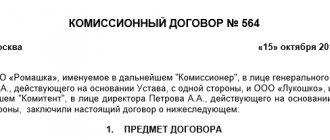Often, in order to sell a particular product, an organization may need to use the services of an intermediary. This is appropriate, for example, when an organization cannot find suitable buyers or does not want to interact with them directly (for example, due to a lack of time, experience or qualified employees). As a result, the organization (client) instructs the intermediary to make transactions with third parties (buyers) aimed at selling the goods.
You can formalize a relationship with an intermediary using one of three types of agreements: commission, agency, commission. The client’s primary task is to choose the optimal type of contract. Failure to do this may result in negative consequences for the client. For example, it turns out that responsibility to the buyer should be borne not by the intermediary who violated his obligations, but by the client himself.
There are several criteria by which to choose the type of mediation agreement:
1) which party has rights and obligations under a transaction with the buyer, which means which party has rights and obligations under such a transaction and is responsible to the buyer for violating its obligations under it;
2) what actions the intermediary has the right to perform;
3) what liability can an intermediary bear for improper execution of an order: is he only responsible for violating his obligations under the intermediary agreement, or is he also responsible for the buyer’s failure to fulfill the transaction;
4) in what cases the intermediary has the right to unilaterally refuse to fulfill the contract;
5) in what cases it is possible to cancel the order given to the intermediary, that is, to terminate the contract unilaterally at the initiative of the client.
For an organization intending to sell a product through an intermediary, it is especially important to take into account the first two criteria. They are analyzed in detail in this recommendation. For other criteria, see the separate recommendation devoted to the choice of an intermediary agreement, regardless of the content and nature of the order - What type of intermediary agreement to choose.
The essence of the agency agreement
The difference between mediation and standard transactions is that the intermediary receives remuneration specifically for the service provided, which consists in attracting third parties. Despite the receipt of funds for goods or services directly by the agent, the ownership of the objects being sold does not pass to him at all stages of the transaction, but belongs to the principal.
A bilateral transaction, under the terms of which one participant, called an agent, undertakes to perform a number of legal actions on behalf of a second participant, called the principal, for a fee - this is what an agency agreement is in essence (Clause 1 of Article 1005 of the Civil Code of the Russian Federation). The peculiarities of an agency agreement are that the transaction is always completed at the expense of the principal, but the agent can act both on behalf of the principal and on his own behalf.
Rules apply to legal relations based on an agency agreement depending on on whose behalf the intermediary agent acts (Article 1011 of the Civil Code of the Russian Federation):
- The agent acts on behalf of the principal - rules for the agency agreement (Chapter 49 of the Civil Code of the Russian Federation). If an agency agreement is concluded between legal entities or when one of the parties is a business entity, then the principal (principal) is obliged to pay remuneration to the agent (attorney) in the amount determined by the text of the agreement (Article 972 of the Civil Code of the Russian Federation), and if not, be guided by similar established market conditions prices under comparable conditions (clause 3 of Article 424 of the Civil Code of the Russian Federation).
- Agency services are provided on one's own behalf - rules for a commission agreement (Chapter 51 of the Civil Code of the Russian Federation). The commission fee is calculated in the same way as an order transaction.
There are legal restrictions regarding the conclusion of agreements. For example, an agency agreement with an individual entrepreneur selling the principal’s goods in a retail network can only be a commission agreement, since when making sales through a stationary outlet, a business entity, by definition, acts on its own behalf.
Agency agreement - sample
: Agency agreement - sample (49.0 KiB, 138 hits)
Restrictions
It is worth noting that an agency agreement cannot be applied in some areas of commercial activity. These areas include the food trade sector (this means that stores do not have the right to take products for sale with the opportunity to return them at any time), the energy supply and gas supply sector (agency in these areas is unjustified, since consumers in a specific place, like are usually deprived of the opportunity to choose a resource supplying organization).
Subject of the agreement
The only essential condition, without which a transaction is considered not concluded, for an agency agreement is an object that does not have a material expression, but represents a number of significant legal actions performed by one party on behalf of the other. If a standard purchase and sale transaction involves settlement with the buyer and settlement with the seller, as with two independent contractors, then an agency agreement with an individual or business entity provides for the conclusion of another agreement linking the principal and the final buyer.
The subject of the agency agreement is exclusively intermediary services paid by the principal. The specifics are determined by contractual terms, and in the absence of specifics, by the norms of civil law. However, it is important for the agent to detail the actions in order to avoid recharacterization of the agreement into a standard transaction with additional tax liabilities during audits.
The order given to the agent may include the following actions:
- searching for wholesale and retail buyers for the owner’s products with subsequent sales on behalf of the principal or one’s own;
- finding performers to perform a specific type of work or provide services ordered by the principal;
- concluding agreements with prospective buyers or sellers in the interests and at the expense of the principal.
Unlike standard bilateral transactions, a mediation agreement involves the involvement of a third party. For example, an agency agreement for the provision of legal services provides for the conclusion of another transaction between the customer and the law firm. As a result, the customer will pay for information, consulting or other legal services, and the agent will receive a fee for intermediary services in attracting a client.
How are income and expenses accounted for?
Agency remuneration is the basis for calculating VAT, that is, absolute income (if VAT is not taken into account) when calculating income tax. As for the principal, the amount of remuneration (excluding VAT) is a gross expense.
Force majeure situations of termination of the contract (independent of either party):
A sales agency agreement can be terminated for various reasons that do not depend on either party (or depend only on one party). It is necessary to indicate such reasons in the contract.
The reasons may be:
- If one party refuses to fulfill the agency agreement previously concluded by the parties;
- If the agent's death occurs;
- If the agent is declared incompetent by the court;
- If the agent is missing (if declared missing by a court decision);
- If one party is declared bankrupt by a court decision.
It is worth specifying the responsibility of each party for violated contractual terms. It is necessary to determine the monetary compensation that the injured party will receive. It is also necessary to specify the time frame for correcting the violation (if such a possibility exists).
Ownership under agency agreements
Features of the agency agreement - funds and property assets received at all stages of the transaction are the property of the principal until the moment of actual sale to the buyer. The absence of a transfer of ownership leads to the absence of tax obligations with proper registration and maximum specificity. The agent is not exempt from liability for damage or loss of assets belonging to the owner located on the territory of the intermediary (Articles 996, 998 of the Civil Code of the Russian Federation).
The participation of a transit agent in settlements makes the situation ambiguous in the tax field. If goods received under agency agreements are subject to capitalization on off-balance sheet accounts, then a number of questions arise in relation to the funds received from the buyer and not transferred to the principal at the end of the tax period. In accordance with Article 128 of the Civil Code of the Russian Federation, the objects of civil rights are:
- property assets, including funds in cash and non-cash form;
- the results of work performed and services provided, accepted on the basis of signed acts;
- intangible assets;
- intellectual property results.
Failure to fulfill obligations, including failure to meet a deadline for either party, leaves the transaction open at the end of the reporting period. For example, receiving an advance payment from a buyer for a product without subsequent shipment is not considered the performance of an intermediary service. However, during audits, tax authorities try to equate the advance to the income received with automatic inclusion in the base for calculating tax liabilities for VAT and income tax.
In favor of the arguments of the fiscal service, the explanations of the Supreme Arbitration Court of the Russian Federation, set out in information letter No. 85 dated November 17, 2004, regarding commission agreements: in the absence of an additional agreement, the funds received are subject to immediate transfer to the principal.
Contract for the sale of goods (sample)
Drawing up a contract is difficult for many companies. An agreement for the sale of goods is formed in writing. The form of the agreement is not fixed by law. You can download a sample commission agreement for the sale of goods and draw up your own agreement using its example.
It is worth considering that civil law does not establish a strict term for the validity of the contract - the contract can be concluded for a certain period or without specifying a period. The contract may or may not outline a specific territory of execution; it may provide a list of goods that are the subject of the commission. When developing your sample contract for the sale of goods, you need to take these points into account.
Agent report and remuneration
The fact of fulfillment of contractual terms must be recorded by drawing up a report by the agent, accepted by the principal within the agreed time frame (clause 1 of Article 1008 of the Civil Code of the Russian Federation). If a bilateral agreement does not establish a period for submitting a report on the execution of an order, then in the absence of claims from the principal within 30 days from the date of transfer, the report is considered accepted (clause 3 of Article 1008 of the Civil Code of the Russian Federation). To avoid additional tax payments, it is recommended to stipulate in an agency agreement with a legal entity:
- execution acceptance mechanism;
- form and content of the report;
- procedure and deadlines for providing documentation;
- factual evidence of expenses incurred, reimbursed by the principal.
The agency report must contain detailed information about the execution of the principal's instructions. If a commission agreement has been concluded, an example of a report on the execution of an order, in addition to the details of the parties, contains:
- a list of sold inventory items broken down by date for the reporting period;
- the transferred amount of funds indicating the details of payment documents;
- expenses incurred related to the execution of the order;
- the amount of commission with reference to the clause of the contractual conditions.
If the agency agreement does not establish the form of the report, then the contractor may submit a document of arbitrary content to the guarantor. But the document must contain information about actions taken in the course of fulfilling obligations, costs incurred, funds received and transferred. Otherwise, the obligations will be considered unfulfilled by the agent.
Payment of remuneration is provided for by the terms of the agreement and can be made:
- by transferring funds by the principal within a specified period;
- carrying out mutual settlement and transferring payment minus remuneration.
The absence of payment terms in the document in question obliges the principal to make payment within a week from the moment the agent submits a report on the fulfillment of obligations (Article 1006 of the Civil Code of the Russian Federation).
Responsibilities of a commission agent under a commission agreement
The main responsibilities of the intermediary are listed in Chapter 52 of the Civil Code of the Russian Federation. The main responsibilities of a commission agent include:
- execution of the principal's instructions on the most favorable terms in accordance with the instructions received;
- if the commission agent was forced to deviate from the instructions received, he must provide this information;
- if the goods were sold at a price lower than the agreed price, the intermediary must refund the difference or prove that the sale at the agreed price was impossible;
- goods received by the intermediary from the principal are the property of the principal;
- the commission agent is responsible for damage or loss of goods that are in his possession and were received from the principal;
- after the order is completed, the commission agent submits a report and transfers everything received under the contract to the commission.
Characteristic differences of an agency agreement
An agency agreement falls into the category of intermediary transactions with nuances of taxation and the specifics of determining the revenue indicator when choosing tax schemes. Details of the differences with a standard purchase and sale transaction are presented in the table:
| Analyzed indicators | Standard delivery | Agency |
| Parties - participants | Supplier and buyer | Principal and agent |
| Subject of the agreement | Inventory | Intermediary services |
| Ownership of sold goods and materials | Transferred from the supplier at the time of receipt of goods and materials according to the invoice | Belongs to the principal until sale to the final consumer |
| Primary document for mutual settlements | Packing list | Agent's report |
| Received payment or advance payment for goods | Considered the property of the recipient of funds, regardless of the fact of settlement with the supplier | Only the remuneration is considered the property of the agent, and becomes the property of the principal at the moment of transfer of funds by the agent |
| Date of occurrence of tax obligations | Each delivery or receipt of advance payment | Date of drawing up the report for the agent, receipt of funds for the principal |
When choosing a taxation system, the key parameters include the turnover or revenue indicator. Brave taxpayers can only include commission when calculating the indicator.
Order execution deadline
The condition on the deadline for executing the order is not essential and is not mandatory for agreement. However, we recommend including it in the contract, as this will avoid uncertainty in the relations of the parties and protect their interests.
This condition may be useful to the principal who instructs the agent to sell products with an expiration date or seasonal goods. If the agent is not limited in terms of execution of the order, implementation on conditions favorable to the principal may be impossible. For example, if an agent must sell Christmas tree decorations, it is advisable to include in the contract a condition on the execution of the order before December 31. After this date, there will be a sharp drop in demand for the product and it will be almost impossible to sell it on favorable terms.
This condition will protect the interests of the agent if a large batch of goods is to be sold. If the contract does not establish a deadline for the execution of the order, the agent will have to fulfill the obligation within seven days from the date the principal presents the corresponding demand (Clause 2 of Article 314 of the Civil Code of the Russian Federation).
The period can be determined, in particular, by a specific date or period, calculated from a certain moment, for example, from the moment of conclusion of the contract or provision of goods by the principal (Article 190, paragraph 1 of Article 314, Article 327.1 of the Civil Code of the Russian Federation).
Similarities and differences
We have already mentioned that an agency agreement is a subtype of a commission agreement. Both agreements imply the integration of an intermediary into the chain of promotion of goods from the manufacturer (owner) to the final buyer. That is, both the commission agent and the agent perform certain actions related to the sale of goods on behalf of another person.
However, these two agreements differ significantly in terms, powers of the intermediary, subject composition and obligations of the parties. Therefore, replacing an agency commission agreement with a commission agreement is unacceptable.
Below we will look at the features of each of these agreements and note their differences so that when concluding an agreement there are no errors in the application of the law.








